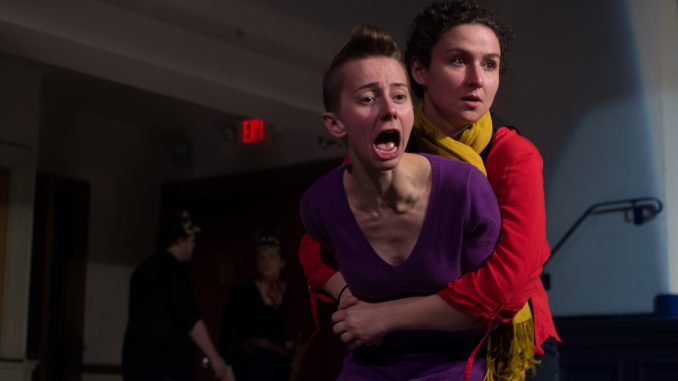
For director Steve Wei, his latest production, “The Rover,” was the perfect opportunity to “pull the rug out from under the audience.”
Aphra Behn’s “The Rover” questions gender roles and personal agency by tricking audiences into rooting for a sexual predator, added Wei, a 2014 theater alumnus. “The Rover,” written in 1677, is believed to be the first play written by a woman during the Restoration period in England, and carries themes of sexual assault and violence from a female perspective. The play will run from April 8-23 at First United Methodist Church of Germantown.
“We wanted to do a show which told a story of people who don’t get to speak, whose stories don’t get told as much as we would like or in the way that we would like,” Wei said. “In this case, we chose a feminist story.”
“What’s really interesting is that it was written by a woman in a time that women weren’t even expected to write or have their voices heard, or even write about their own ability to try to gain agency,” said Ian Connito, a theater major who plays a female servant. “Which is a big deal in this play.”
One reason Wei chose to gender-swap characters was to show that most traits and injustices are universal. With themes that trace back to the 17th century, Behn’s story can translate to modern day events.
In an unusual choice, Wei’s production of “The Rover” features a male sexual predator played by a woman.
“This is a special production in that a lot of women are playing men,” Wei said. “People often play characters that they have a relationship with. So we ended up with a lot of characters that take away the element of, ‘Oh this is just about women,’ because it’s not. It’s about society as a whole.”
Stage manager Travis Braue-Fischbach, a 2013 journalism alumnus, said Behn’s ability to write about the struggles from that time period is quite a feat.
“Aphra Behn has a very good wit and a very good social sense,” Braue-Fischbach. “To pick up on what she felt were the injustices of her time, to perceive what male and female roles were. She takes that and adds her delicious little juicy commentary on it.”
One scene involves the sexual assault of a young woman. Wei said this production is important for students in particular to watch because assault on campus is a real issue, while the theater’s older audience can remember sexism and misogyny from their time.
“When Restoration plays were being written, the sex comedies were all about objectifying women and they were always into it,” Wei said. “Even if [the women] weren’t sure what was going on, it was later on in the story that that event was redeemed. That doesn’t happen here. We never forgive the characters.”
In addition to dark themes and gender-swapped roles, “The Rover” also features complex dramatic sword fighting. This aspect of production is crucial for the realism that Wei wants to bring to the performance.
“The production brings up a lot of questions, like the historical accuracy of the storyline,” Braue-Fischbach said. “This was one of the periods that had a lot of different weapons.”
Both Connito and Wei are certified masters of various swords and weapons. Wei teaches single sword fighting at Temple. Connito’s interest in stage fighting led him to audition for “The Rover.”
“The Rover” is produced in partnership with The Drama Group, with the newly founded Jackpine Theatre. Wei hopes the Jackpine will allow him to bring more relevant classical plays to a modern audience.
“I see a lot of theater where there isn’t a very strong message,” Wei said. “I feel like there isn’t a point, like it’s just supposed to be for entertainment. And theater has a very special place where it can teach as well as be entertaining at the same time. … But then you walk away from it feeling changed. … This is the most ambitious thing I’ll be doing for a while.”
Katelyn Evans can be reached at katelyn.evans@temple.edu.


Be the first to comment